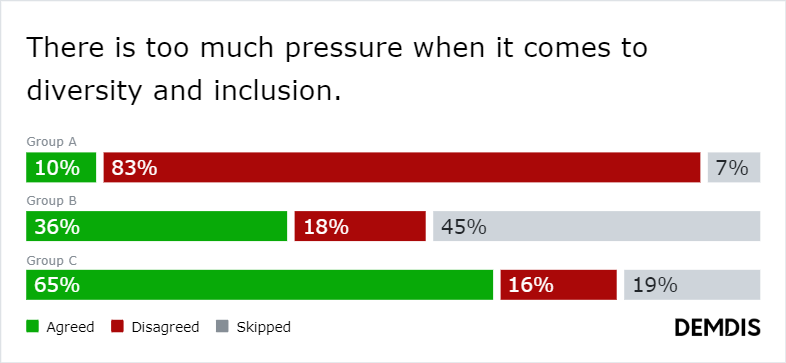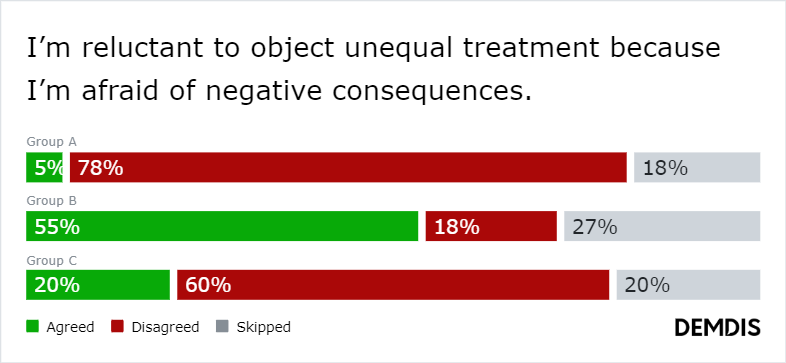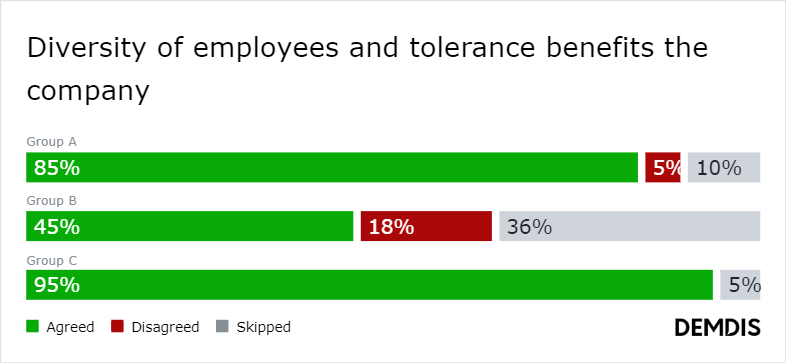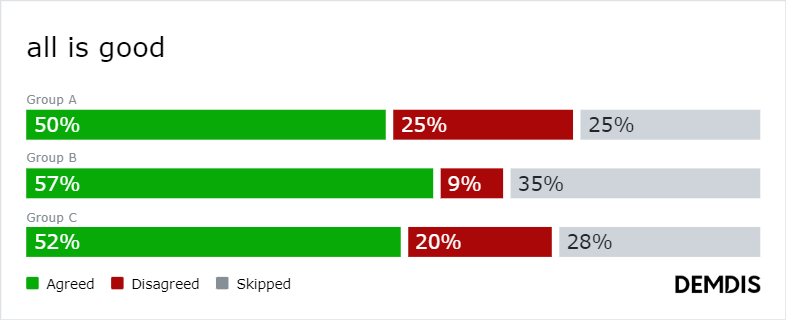Despite identified divisions we feel accepted, and we appreciate this kind of open dialogue.
Let’s continue in our discovery. Understanding what’s happening on the ground is a necessary step towards finding solutions.
If not all is good, then where do you see problems that need to be addressed? Which negative experience would you not like to repeat?
Vote for at least 10 comments to make your voice heard. If you participate through the same browser, you should be seeing only new statements. The discussion is completely anonymous (no personal data is gathered) because we value openness and honesty.
Thanks for your participation!
Who participated? (Main divisions)
The discussion about diversity and inclusion seems to interest us. More than 110 employees of Adient participated in this form of fair and open dialogue (live report). At the time of writing this mid-report (19.1.) the participants were automatically distributed (based on their opinions) into three opinion groups - A, B and C. The main divisions lay in the question regarding the benefits and importance of applying diversity and inclusion principles in Adient.
Group B (42 participants) and Group C (42 participants) have a lot in common. They “rate the company's efforts for diversity and inclusion positively” and they feel that they can “freely and openly express their opinions at work”. The main difference between groups lies in their opinion: “There is too much pressure when it comes to diversity and inclusion.” With this statement Group A agrees in majority, while Group B disagrees.

Group A (11 participants) is mostly sceptic and unsure about the topic of diversity. This group paradoxically have the most experience with discrimination, disdain, and disrespect. Relative majority thinks that “employee diversity is an obstacle to efficiency,” and that “there’s too much pressure when it comes to diversity and inclusion”.

Participants in this group are also unique with their experiences. 40% have encountered discrimination in the workplace. Half of the group is reluctant to object to unequal treatment because of concerns of negative consequences and 60% think that they cannot freely and openly express their opinions at work.
We feel accepted, but…
Despite the identified divisions there’s been found a strong consensus on that “diversity of employees and tolerance benefits the company”. In the majority we feel accepted and respected at work (86%), we don’t mind colleagues with different sexual orientation (89%), and we appreciate this kind of open and fair dialogue (85%).

Nevertheless, these preliminary results also show us that not everything is ideal. Besides the concerns of individual opinion groups, we’ve consensually agreed that “toxic positivity is a real thing”. There’s also a significant (and relative) majority (45%) of participants that are convinced, that “employees should not present their religious beliefs at work”.
All is good?
Adient believes in the principles of diversity and inclusion. That’s why we’re conducting this kind of fair and open dialogue. But as the preliminary results show us, only 55% of participants think that “all is good” and 43% have nothing more to say. I looks like there’s room for improvements.

Understanding what’s happening “on the ground” and what’s your individual experience is a necessary precondition for finding solutions.
Let’s continue together in this participative discovery and share your individual concerns, experiences, or potential solutions. Is really “all good”? And if not, what’s the reason?
Thanks for your continuing participation!
About the cooperation
DEMDIS is a civic association that engages the public in decent, fair, and open discussion and finds consensus in a polarized society. Currently, in cooperation with the company Adient, we are opening an original format of an internal discussion on the topic of diversity and inclusion. In case you have any questions do not hesitate to contact us at [email protected]


